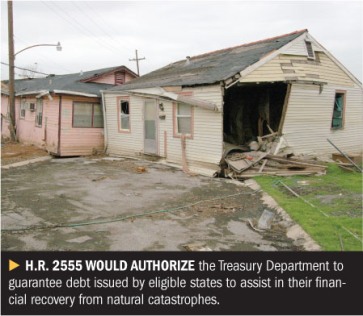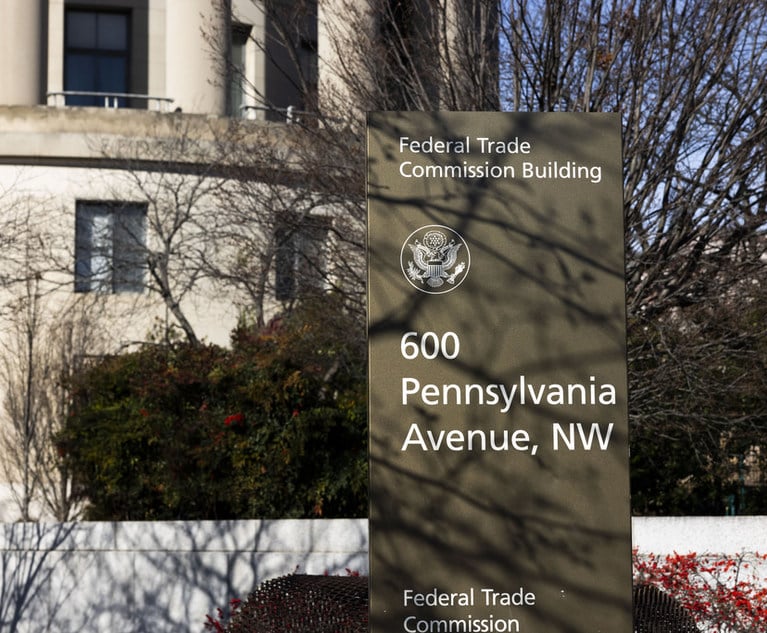A coalition of environmental and conservative groups, backed bya consortium of insurance interests, has joined forces to fightlegislation to create a federal catastrophe insurance pool.
|As part of their effort, an official from the Sierra Club and amember of the Competitive Enterprise Institute launched a new Website for the coalition–Americans for Smart Natural CatastrophePolicy. The new Web site and renamed group isSmarterSafer.org.
Last week's launch also served as an opening salvo againstlegislation introduced in the House last month by Rep. Ron Klein,D-Fla, that would allow states to create a national catastropheinsurance pool.
|"The proposals that are being made to change the way that theUnited States backstops catastrophe risk from Rep. Klein, webelieve, are an attack on the free market," said Eli Lehrer,director of the insurance project at the Competitive EnterpriseInstitute, a conservative think tank.
|"There is a productive private industry, and we believe theseproposals, although made from somebody with his heart in the rightplace, are simply likely to destroy a productive industry," hesaid.
|He added that the legislation would "impose a significant burdenon taxpayers around the country" and undo reforms that states areundertaking to improve the underwriting environment forinsurers.
|"We feel it is important to take action now to protect lives andproperty that are at risk for natural catastrophe, making propertymore resilient to catastrophes like hurricanes and opposingpolicies that will essentially provide incentives to people tolocate in risky places," said Ed Hopkins, Sierra Club's director ofenvironmental quality.
|Mr. Hopkins said there is a better way of providing forprotection through programs to help homeowners strengthen theirhomes against hurricanes "and reduce the underlying risk."
|Mr. Lehrer said that based on the defeat of legislation to makewind risk a part of the National Flood Insurance Program, andlukewarm support by the Obama administration for expanding thefederal government's exposure to catastrophe, he felt confidentRep. Klein's bill would be defeated.
|"I think there is a lot of opposition to this," said Mr.Hopkins. "And we will be working hard to make sure that the conceptof wind insurance advances during this Congress."
|According to the group's Web site, the coalition is supported byAllianz of America, the Association of Bermuda Insurers andReinsurers, Chubb, Liberty Mutual Group, the National Associationof Professional Insurance Agents, the Reinsurance Association ofAmerica, Swiss Re, USAA and Zurich.
|Mr. Lehrer said there is a large, diverse group ranging fromenvironmental to consumer to public policy and taxpayer advocacygroups involved in defeating this and similar legislation.Additional information is available at www.smartersafer.org.
|While introduction of Rep. Klein's measure prompted a generallypositive reaction from the Independent Insurance Agents and Brokersof America, even the IIABA said it would seek changes in the bill'sreinsurance component.
|H.R. 2555 is similar to legislation that passed the House in2007, but was rejected by the Senate in 2008 as an amendment tolegislation that would reform and reauthorize the National FloodInsurance Program.
|One problem is that it establishes a guarantee program thatwould authorize the Treasury Department to backstop debt issued byeligible states to assist in their financial recovery from naturalcatastrophes.
|Another difficulty is a provision to allow the TreasuryDepartment to write reinsurance contracts coveringcatastrophic-level events, as well as establish a grant program todevelop, enhance and maintain programs that prevent and mitigatelosses from natural catastrophes.
|All these conflict with a recent Obama administration budgetdocument, which says the administration hopes to revisit theTerrorism Risk Insurance Program to see if its high budget impactcan be reduced.
|Rep. Klein maintained his bill has "broad bipartisan support,"with more than 40 co-sponsors from 21 states across thecountry.
|He said that "prospects for passage are extremely favorable,buoyed by the innovative approach and strong support of PresidentObama, who co-sponsored the legislation as a member of the U.S.Senate two years ago."
|The bill would create the National Catastrophe Risk Consortium,which states could join for purposes of transferring catastrophicrisk. The transfer would be achieved through issuance ofrisk-linked securities or through reinsurance contracts.
|The consortium, under the bill, would serve as a conduit issuerof cat bonds on behalf of participating states, but would not takeactual possession of any bond proceeds, coupon payments orunderlying risk, according to a summary of the bill'sprovisions.
|In its comments, the IIABA said it supports the goals of each ofthe programs that would be established under the bill, but alsoencourages Congress to consider making changes to the reinsurancetitle of the legislation in particular.
|"While the Big I appreciates Congress' consideration of anational reinsurance backstop for natural disaster insurance, wefeel that such a backstop would better encourage private marketparticipation in problematic markets if it allowed private marketparticipation instead of just state catastrophe funds," saidCharles E. Symington Jr., senior vice president of governmentaffairs.
|"We will continue to advocate that Congress consider a solutionutilizing the private markets instead of merely state catastrophefunds," he said.
Want to continue reading?
Become a Free PropertyCasualty360 Digital Reader
Your access to unlimited PropertyCasualty360 content isn’t changing.
Once you are an ALM digital member, you’ll receive:
- All PropertyCasualty360.com news coverage, best practices, and in-depth analysis.
- Educational webcasts, resources from industry leaders, and informative newsletters.
- Other award-winning websites including BenefitsPRO.com and ThinkAdvisor.com.
Already have an account? Sign In
© 2024 ALM Global, LLC, All Rights Reserved. Request academic re-use from www.copyright.com. All other uses, submit a request to [email protected]. For more information visit Asset & Logo Licensing.








